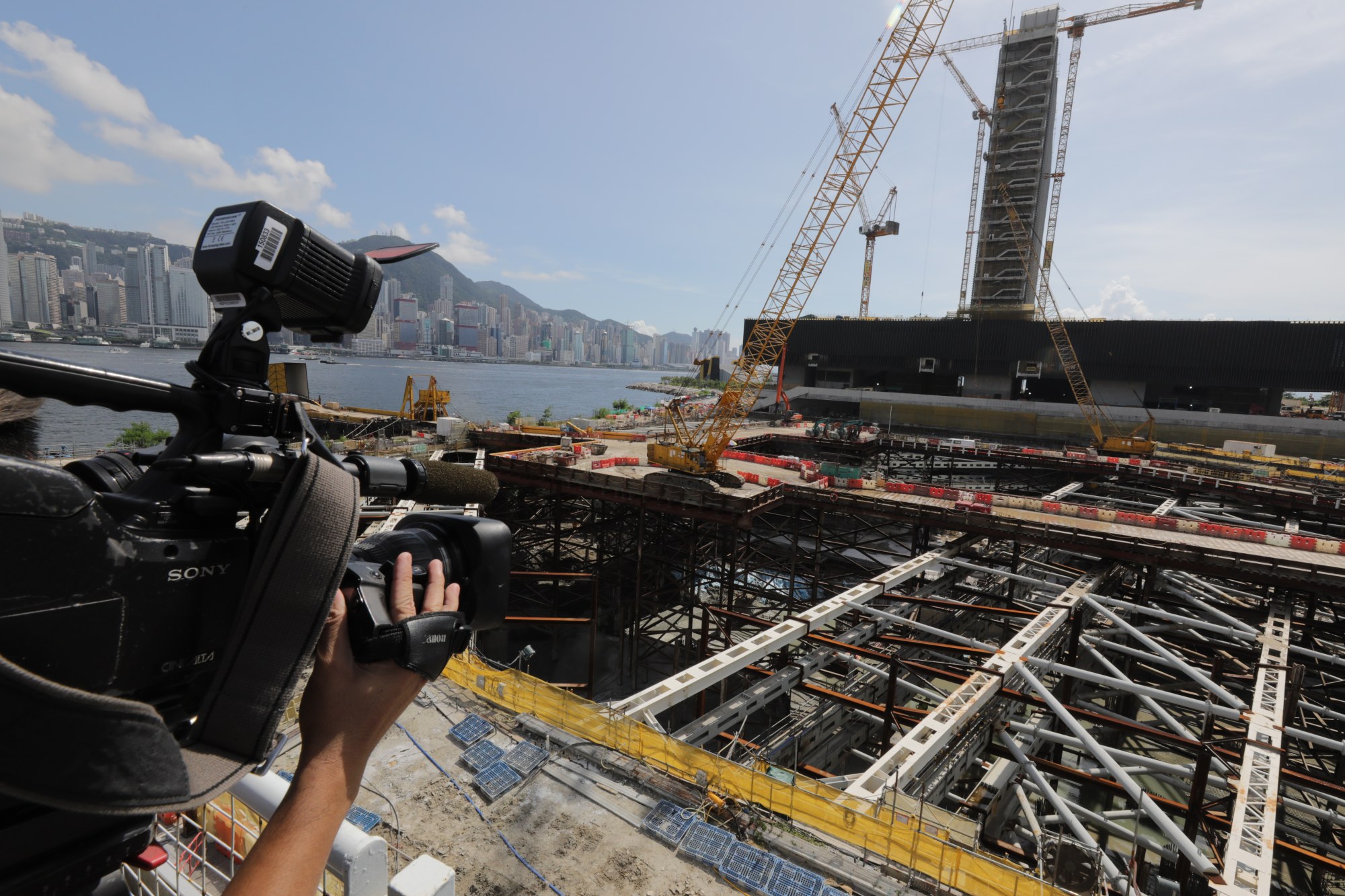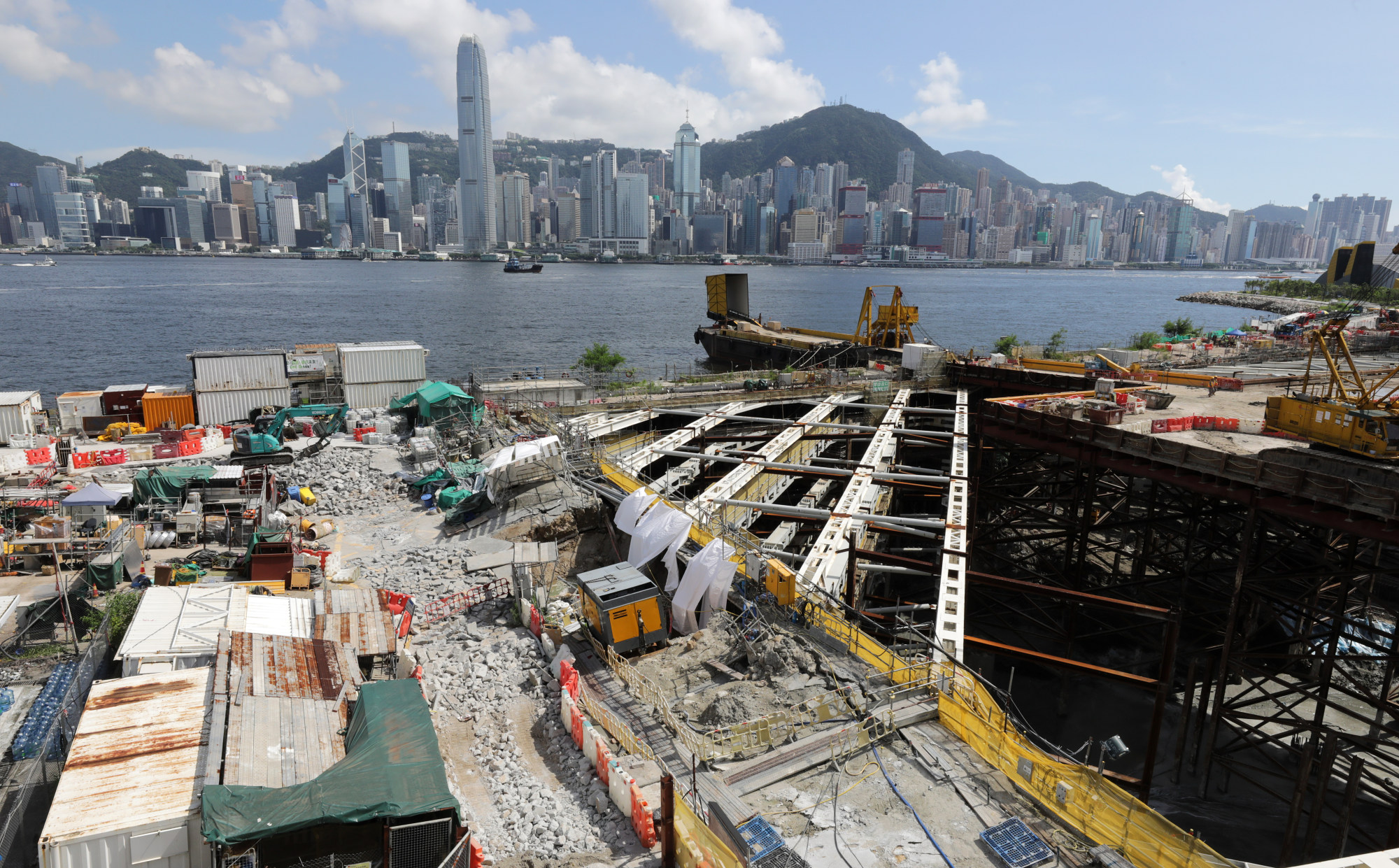“It’s a challenging complex to build,” Fung said.
She explained that a change of plans meant bringing together three separate theatres into one and building them at the same time. These are the 1,450-seat Lyric Theatre, a 600-seat medium-sized venue and a 270-seat studio one.

“It was not as complicated initially, but the authority wanted to amalgamate three facilities into one,” Fung said. “Putting them together makes it more difficult, even though it will be cheaper to build it in one go than separately.”
The complex will also have rehearsal spaces large enough for an orchestra, studios that can serve as bases for theatre groups, offices and food and drink areas large enough for banquets.
If the project meets its new 2026 completion target, the complex will have to be fitted out before opening. Fung did not say when that might be.
Construction resumes on theatre complex at West Kowloon arts megaproject
Construction resumes on theatre complex at West Kowloon arts megaproject
The Lyric Theatre is the next major landmark at the 40-hectare arts hub after the M+ Museum, Hong Kong Palace Museum and Xiqu Centre.
Fung did not say if the theatre project’s delay would lead to a budget overrun. But she revealed that the authority’s financial health had improved slightly after efforts to cut costs and raise revenue, but the pressure to raise funds for sustainable development remained.
She earlier warned that the government’s one-off endowment of HK$21.6 billion (US$3 billion) in 2008 for the arts district would dry up by March next year.
She said the growth in visitor numbers, although lower than expected, had helped its income. Its cash flow was now likely to run out by June 2025, three months later than at first predicted.

A HK$4 billion loan the authority signed with nine banks in 2022 will mature next year. Fung said it would negotiate the way forward with HSBC and Standard Chartered Bank.
“It is not ideal to rely on bank loans to sustain operations, but we are still waiting for the government’s reply to our earlier request to revise the land use and funding model for sustainable development,” she said.
The authority has asked for government approval to amend the commercial components for land yet to be tendered, which might shift away from the build-operate-transfer and income-sharing model adopted for a plot tendered in 2022.
Hong Kong has plenty of room for manoeuvre on debt-to-GDP ratio, economist says
Hong Kong has plenty of room for manoeuvre on debt-to-GDP ratio, economist says
But Fung conceded that the plan depended on the state of the market, which is at present facing a downturn.
The authority’s net cash stood at HK$6.5 billion on March 31 last year. Its deficit was 7 per cent lower at HK$718 million in 2022-23 compared with a year earlier.
Fung said the latest statistics showed that 70 per cent of visitors to the district’s two museums – M+ and Palace Museum – were tourists, about half of them from mainland China. The rest were residents.

Visitors from Europe and the United States made up 10 per cent of total arrivals.
“The two museums have a combined capacity to welcome more than 4 million visitors every year,” Fung said. “I can’t rely just on Hong Kong visitors. This 70-30 split is the correct ratio.”
The theatre complex delay is the latest setback at the massive West Kowloon Cultural District development.
Hong Kong airport expansion project will be finished on time, No 2 official vows
Hong Kong airport expansion project will be finished on time, No 2 official vows
The M+ museum’s opening was delayed by four years from 2017 to 2021. The Xiqu Centre’s opening was also delayed for years by construction of the high-speed railway terminus next to it.
The Culture, Sports and Tourism Bureau said the government had engaged an independent consultant to help to review the authority’s financial position and proposal.
The bureau added the consultant would also help to explore “other viable means to help alleviate [the authority’s] financial challenges”.
“If [the authority] needs to implement a new financial proposal, the government will provide suitable assistance and keep members of the public informed as and when appropriate,” it said.
Lawmaker Johnny Ng Kit-chong, a member of the Legislative Council’s culture panel, said hoped the Lyric Theatre’s completion would be speeded up, but added that the situation was understandable.
“The manpower crunch in Hong Kong has caused delays in many projects – there is a shortage of construction workers,” Ng said. “The pandemic also played a part in the delay.”
He said that if the government considered the authority’s suggestions to address the arts hub’s financial problems feasible, it should respond as soon as possible.
Ng added that he was confident in the proposal put forward by the authority’s chairman, Henry Tang Ying-yen, to amend the arrangements for commercial plots.
Ng did not rule out the possibility of Legco approving government funding for the hub.
“It will depend on what’s put forward,” he said. “If there are concrete long-term plans to achieve financial sustainability, we’d consider it.”

